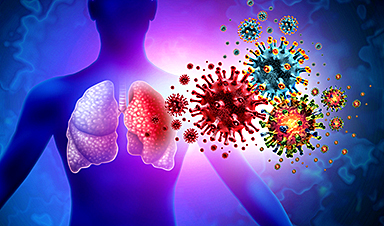The term 'tripledemic' has hit headlines this week as the NHS begins its Covid and fluvaccine roll-out for vulnerable adults.
As the cold weather sets in, many of us have experienced a decline in health, and this may be due to a trio of viruses that are currently circulating around the UK.
Older people, care home residents and people with health conditions are all eligible for vaccinations, with jabs set to be given from Thursday.
The latest roll-out comes after health officials raised concerns about a fall in the uptake of the flu vaccine after it emerged the illness had caused at least 18,000 deaths in the last two years.
But what is a 'tripledemic'? And how can we protect ourselves against the nasty winter viruses that are doing the rounds?
What is a 'tripledemic'?
"A 'tripledemic' refers to side-by-side outbreaks of three respiratory illnesses, typically occurring during the autumn and winter seasons," explains Dr Chun Tang, a GP at Pall Mall. "In recent years, it's been used to describe the simultaneous spread of Covid-19, influenza (flu), and respiratory syncytial virus (RSV).
"Each of these viruses can cause severe illness, especially in vulnerable groups like the elderly, young children, and those with weakened immune systems."
"It is of particular concern now because, as these viruses circulate together, they can put pressure on the NHS due to a greater influx of patients," says Tang.
Do RSV, flu and Covid-19 have similar symptoms?
"RSV, flu, and Covid share many overlapping symptoms like fever, cough, runny nose, and fatigue, which can make it difficult to tell the difference between them," notes Tang.
However, some are some key differences to look out for.
"Covid-19 may lead to a loss of taste or smell and more frequent breathing difficulties," highlights Tang. "RSV often causes wheezing and is more likely to affect infants, while the flu tends to hit quickly with sudden fever and body aches.
"If you're unsure, testing can confirm which virus is responsible."
Tang urges anyone whose symptoms become severe or worsen over time to contact their local GP, especially if you have trouble breathing, persistent high fever, confusion, or chest pain.
"For infants, seek medical attention if they are struggling to breathe, are dehydrated, or if the child becomes unusually lethargic," he adds.
Is it possible to get all three viruses at the same time?
"Yes, it's possible to contract more than one of these viruses together," warns Tang. "Being infected with multiple respiratory viruses can increase the severity of illness and make it harder for the body to recover, especially for those with weakened immune systems or existing health conditions."
"The people most vulnerable to severe illness from a tripledemic include young children, older adults, and individuals with underlying health conditions, such as asthma, diabetes, or weakened immune systems," says Tang.
"Babies under the age of one, especially those born prematurely, are at higher risk from RSV, while older adults and those with chronic conditions may face more serious complications from the flu and Covid-19."
Treatment depends on the virus causing the illness.
"Flu and Covid-19 have antiviral medications available, but they work best when started early," explains Tang. "RSV typically requires supportive care, such as fluids, rest, and fever control, though severe cases in infants may require hospitalisation.
"For all three, the focus is on managing symptoms – hydration, rest, and medication to control fever and discomfort."
You can protect yourself by keeping up to date with available vaccines.
"There are vaccines for flu and Covid-19, and this year an RSV vaccine has been approved for older adults," highlights Tang. "Vaccination is crucial for reducing the risk of severe illness."
Eligible people can book in for a vaccination via the NHS website, the NHS app, or by calling 119 for free.
Practicing good hygiene is also very important.
"Regular hand washing, mask-wearing in crowded places, and staying home when sick can help reduce the spread," says Tang.
Taking vitamin D supplements can also help support immune health.
"Many older adults are at risk of vitamin D deficiency, particularly in winter when sunlight exposure is low," explains Tang. "While vitamin D can help boost overall immunity, it's not a specific treatment for these viruses.
"However, ensuring adequate levels through supplements or diet may help reduce the risk of respiratory infections."
News
Does being infected or vaccinated first influence COVID-19 immunity?
A new study analyzing the immune response to COVID-19 in a Catalan cohort of health workers sheds light on an important question: does it matter whether a person was first infected or first vaccinated? [...]
We May Never Know if AI Is Conscious, Says Cambridge Philosopher
As claims about conscious AI grow louder, a Cambridge philosopher argues that we lack the evidence to know whether machines can truly be conscious, let alone morally significant. A philosopher at the University of [...]
AI Helped Scientists Stop a Virus With One Tiny Change
Using AI, researchers identified one tiny molecular interaction that viruses need to infect cells. Disrupting it stopped the virus before infection could begin. Washington State University scientists have uncovered a method to interfere with a key [...]
Deadly Hospital Fungus May Finally Have a Weakness
A deadly, drug-resistant hospital fungus may finally have a weakness—and scientists think they’ve found it. Researchers have identified a genetic process that could open the door to new treatments for a dangerous fungal infection [...]
Fever-Proof Bird Flu Variant Could Fuel the Next Pandemic
Bird flu viruses present a significant risk to humans because they can continue replicating at temperatures higher than a typical fever. Fever is one of the body’s main tools for slowing or stopping viral [...]
What could the future of nanoscience look like?
Society has a lot to thank for nanoscience. From improved health monitoring to reducing the size of electronics, scientists’ ability to delve deeper and better understand chemistry at the nanoscale has opened up numerous [...]
Scientists Melt Cancer’s Hidden “Power Hubs” and Stop Tumor Growth
Researchers discovered that in a rare kidney cancer, RNA builds droplet-like hubs that act as growth control centers inside tumor cells. By engineering a molecular switch to dissolve these hubs, they were able to halt cancer [...]
Platelet-inspired nanoparticles could improve treatment of inflammatory diseases
Scientists have developed platelet-inspired nanoparticles that deliver anti-inflammatory drugs directly to brain-computer interface implants, doubling their effectiveness. Scientists have found a way to improve the performance of brain-computer interface (BCI) electrodes by delivering anti-inflammatory drugs directly [...]
After 150 years, a new chapter in cancer therapy is finally beginning
For decades, researchers have been looking for ways to destroy cancer cells in a targeted manner without further weakening the body. But for many patients whose immune system is severely impaired by chemotherapy or radiation, [...]
Older chemical libraries show promise for fighting resistant strains of COVID-19 virus
SARS‑CoV‑2, the virus that causes COVID-19, continues to mutate, with some newer strains becoming less responsive to current antiviral treatments like Paxlovid. Now, University of California San Diego scientists and an international team of [...]
Lower doses of immunotherapy for skin cancer give better results, study suggests
According to a new study, lower doses of approved immunotherapy for malignant melanoma can give better results against tumors, while reducing side effects. This is reported by researchers at Karolinska Institutet in the Journal of the National [...]
Researchers highlight five pathways through which microplastics can harm the brain
Microplastics could be fueling neurodegenerative diseases like Alzheimer's and Parkinson's, with a new study highlighting five ways microplastics can trigger inflammation and damage in the brain. More than 57 million people live with dementia, [...]
Tiny Metal Nanodots Obliterate Cancer Cells While Largely Sparing Healthy Tissue
Scientists have developed tiny metal-oxide particles that push cancer cells past their stress limits while sparing healthy tissue. An international team led by RMIT University has developed tiny particles called nanodots, crafted from a metallic compound, [...]
Gold Nanoclusters Could Supercharge Quantum Computers
Researchers found that gold “super atoms” can behave like the atoms in top-tier quantum systems—only far easier to scale. These tiny clusters can be customized at the molecular level, offering a powerful, tunable foundation [...]
A single shot of HPV vaccine may be enough to fight cervical cancer, study finds
WASHINGTON -- A single HPV vaccination appears just as effective as two doses at preventing the viral infection that causes cervical cancer, researchers reported Wednesday. HPV, or human papillomavirus, is very common and spread [...]
New technique overcomes technological barrier in 3D brain imaging
Scientists at the Swiss Light Source SLS have succeeded in mapping a piece of brain tissue in 3D at unprecedented resolution using X-rays, non-destructively. The breakthrough overcomes a long-standing technological barrier that had limited [...]





















